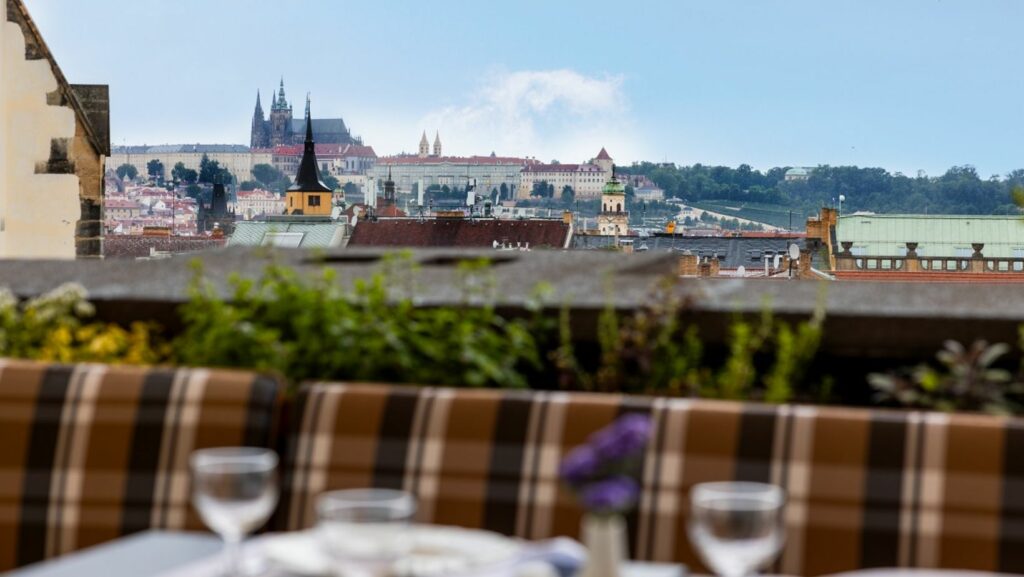From January 2024, the Czech Republic will witness a reduction in VAT on food products, dropping from the current 15% to 12%.
Back in August, retailers assured the government that this decrease would be transparently reflected in final prices, bringing relief to shoppers.
However, on Monday, December 4th, Tomáš Prouza, President of the Union of Trade and Tourism of the Czech Republic, revealed that there will be no reduction in food prices; instead, they are set to rise significantly in the new year.
Prouza clarified, “We find ourselves compelled to raise prices. Producers have alerted us to a 10-15% increase in the cost of products. The decision by the Energy Regulatory Office of the Czech Republic will substantially escalate their electricity costs, and the government has declined assistance. A 3% VAT reduction won’t bridge this gap.”
Disappointment marked the Minister of Agriculture’s response to the meeting. Vyborný expressed his disillusionment, stating, “Retail chain representatives assured me that the VAT reduction would genuinely impact food prices. Today, I am disheartened to hear that prices will surge from January 1st.”
He pressed retail chain representatives at the meeting about the higher cost of products in Czech supermarkets compared to neighboring countries.
Unfortunately, a clear answer was not forthcoming. “Even the VAT difference fails to explain why products in Czech supermarkets are 70% more expensive than in Poland. The practice of retailers selling some products with mark-ups of several hundred percent is unacceptable. I struggle to comprehend selling a kilo of carrots for CZK 9.3 and retailing it for CZK 27.9 – a staggering 261% mark-up.”
Vyborný stressed that neither his department nor the government possesses legislative tools to intervene in the market and influence pricing.
Instead, he intends to exert informal pressure on retail chains and encourage the Office for the Protection of Competition to take a more active role.
According to the head of the Ministry of Agriculture, there are no objective grounds for the rise in product prices.
He cited the example of Madeta, the largest Czech producer of dairy products, which announced a 3-5% price increase last week due to rising electricity and fuel costs, despite a significant decrease in wholesale milk prices.
Heavy snowfall is causing problems around Czechia. Many smaller roads are impassable and a heightened number of accidents are complicating traffic along the country’s main highways.
A state of emergency is in place in the South Bohemia region which had 75 centimeters of fresh snow overnight. Power outages have left thousands of people without heating.
Train services were halted in various parts of the Czech Republic, mainly due to trees falling on tracks or switches breaking down.
The South Bohemia region experienced most of the reported issues, affecting sections like Tábor – Pelhřimov and Ražice – České Budějovice. Snowfall also disrupted several fast train connections.
The Vysočina region also reports severe complications and drivers have been advised not to set out for the mountain regions if possible. Although road maintenance workers are out in force, the situation is complicated by fresh snow which should continue falling throughout the day.
Between 30 and 40 centimeters of fresh snow are expected to fall in southern Bohemia and Moravia, Prague should see between 15 and 30 centimeters of fresh snow on Saturday.
A truck accident on D1 towards Brno caused a 20-kilometer traffic jam. Radek Mátl, director general of the Czech Roads and Motorways Directorate, expressed the struggle to keep the roads passable despite extensive efforts.
Various regions experienced additional problems.
In Central Bohemia, police responded to a collision on the I/3 road near Pětihost, resulting in a road closure. Western Bohemia faced slushy snow on the D5 near Plzeň, leading to accidents and road closures. In the Hradec Králové region, the D11 motorway experienced slushy snow or ice.
Prague 1 has introduced a ban on nighttime entry to specific areas within the Old Town.
The City Hall has revised traffic regulations, displaying prohibition signs with additional information in key streets such as Pařížská, Dlouhá, Rybná, Břehová, and Kozí.
The proposed measure seeks to maintain a tranquil and secure environment, fostering an overall high quality of life.
Residents of Dlouhá street, where a large number of popular nightlife venues are located, have long complained about the noise.
The restricted area, delineated by Dvorak’s Embankment, Pařížská, and Revoluční, will be off-limits from 10 pm to 6 am. Each prohibition sign is accompanied by a supplemental indicator specifying the time.
The ban will not apply to vehicles involved in supplying goods, medical assistance, repair, maintenance, and communal services, as well as those “transporting disabled individuals, taxis, and vehicles that belong to people residing, accommodating, or having property in the areas designated by the sign”.
Tohle je fakt velký. Začal platit noční zákaz vjezdu bezmála do poloviny Starého Města. 🧵⬇️ pic.twitter.com/cueLV3XQKt
— Filip Lachmann (@LachmannFilip) November 23, 2023
According to Prague 1 spokeswoman Karolina Šnejdarová, the night ban will take effect on Thursday, November 23.
Municipal police and regular police patrols will be empowered to halt drivers during the restricted hours to ensure compliance with the road signs. If necessary, drivers may be requested to provide an explanation for violating the ban.
Šnejdarová mentioned instances of recurring sports car “races” in the area as one of the reasons prompting the decision.
The Czech town of Žatec received the certificate of inscription on the UNESCO World Heritage List on Saturday, two months after the organisation’s committee decided to inaugurate the town and its surrounding hop-growing landscape.
Interest in the hop-growing landscape increased this year, with more tourists visiting the information center and the nearby Steknik Castle, located in the middle of the hop-growing area.
Žatec and its surrounding landscape represent a centuries-old tradition of hop growing.
The new UNESCO site consists of two parts. The first is the landscape, with its hop farms and the villages of Trnovany and Steknik, including the castle. The second part is the historic center of Zatec and its 19th-century industrial quarter, which has the highest concentration of buildings connected with hop processing and trade.
The two parts are connected by the Ohre River. It is the first hop-growing landscape in the world to be awarded UNESCO status.
“For us, this is a confirmation of the exceptional quality of the hops we grow here,” Michal Kovarik, secretary of the Czech Hop Growers Association, told CTK.

The Žatec district is where most of the hops in the country are grown, comprising 3,744 hectares, or 77% of the total area. “This year’s harvest has been good, with around 7,000 tonnes harvested, of which 5,500 tonnes are from Zatec hops,” said Kovarik.
The National Heritage Institute helped Zatec, a town with around 20,000 inhabitants, with the registration. “It’s an extremely long process,” the institute’s Lucie Radova told CTK.
“At the time when they started thinking about it, there was no heritage protection area. During that time, the town has risen up, a lot of monuments and buildings that were not in good condition have been restored.” She said she appreciated the town’s efforts to help owners of unprotected buildings with repairs.
On Wednesday, 15 November, a vending machine offering filtered tap water was installed at Prague Main Station.
This marks the beginning of the “Plastic-free railway” (Železnice bez plastů) ecological project started by the Czech Railway Transport Authority.
In the coming weeks, similar machines will be introduced at Kolín, Praha-Smíchov, Hradec Králové hl. n., Náchod, Děčín hl. n., Plzeň hl. n., České Budějovice, and Břeclav railway stations.
The water stations will be conveniently placed in halls or main corridors and will use carbon filtration in combination with UV-C LED technology to ensure water quality.
The primary aim of the project is to encourage passengers to minimize waste in public spaces and provide them with an alternative to bottled water.
Jiří Svoboda, the director general of the Railway Administration, explained that the project’s goal is to provide passengers with a more sustainable alternative to buying bottled water.
“In the current situation, people don’t really have a choice, and when they decide on their drinking regime while traveling by train, they usually end up buying bottled water. In addition, our long-term surveys and experience show that classic public drinking fountains are not among the preferred sources of drinking water, mainly because of their hygiene,” he said.
People can easily fill their bottles with high-quality chilled filtered water, whether carbonated or non-carbonated.
This initiative is carried out in collaboration with Lokni. By downloading and registering on its mobile application (available on iOS and Android), users can get 0.5 liters of water free of charge daily, exclusively at railway stations with the Nádraží zero tariff.
A separate tariff offers students 3 liters of water per day free of charge.
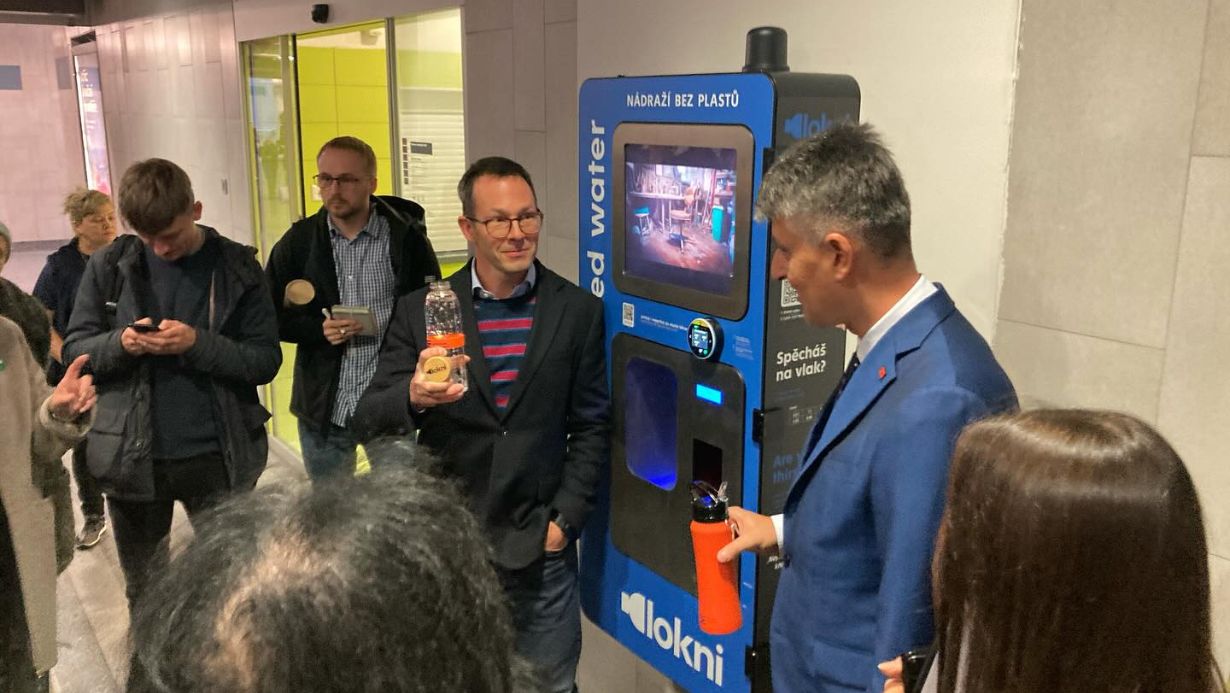
Alternatively, when using a bank card for payment, a half-liter of water costs 6 CZK, a liter costs 8 CZK, and a liter and a half costs 10 CZK.
“We are establishing a network of filtration stations where people can confidently refill their bottles with high-quality filtered water instead of purchasing water in plastic bottles. Bottled water imposes unnecessary strain on the environment. Our dispensers filter out impurities, bacteria, viruses, harmful chemical residues, and more,” stated Martin Vaclavik, founder of the Lokni startup.
The contract, signed between the company and railway workers, outlines the installation of vending machines at 12 railway stations, scheduled to run for five years.
If the project proves successful, the parties do not rule out the possibility of extending and expanding the collaboration.
Our best stories straight to your WhatsApp. Sign up here
The Machine has forged a 30+ year reputation for extending the musical legacy of Pink Floyd.
The New York-based quartet performs a diverse mix of Floyd’s extensive 16-album repertoire, complete with faithful renditions of popular hits as well as obscure gems.
With stellar musicianship and passionate delivery, The Machine explores collective improvisation rivaling that of an early 1970’s Pink Floyd, while their use of expanded theatrical elements and elaborate stage displays and lighting continues The Floyd spirit of the 1980’s.
On December 1, they will perform at the Prague Congress Centre. Tickets are on sale here.
The band is also known for recreating entire albums as a part of their show, accepting requests from fans, and for taking an A – Z approach in which one song is played for every letter of the alphabet.
The Machine has sold out theaters, premier showcase rooms and casinos across North America, Europe and Asia, performed at renowned music festivals such as Bonnaroo, Riverbend, and Gathering of the Vibes, and shared the stage with full symphony orchestras, including the Atlanta, Detroit, Pittsburgh, Jacksonville, Charlotte and San Diego Symphonies, as well as the Buffalo Philharmonic.
The band features founding member Tahrah Cohen (drums), longtime bandmates Scott Chasolen (keys, vocals) and Ryan Ball (guitar, vocals), and newest member Chris DeAngelis (bass, lead vocals).
The band continues on to celebrate the music of Pink Floyd and to honor the life of Joe Pascarell, who co-founded the band with Tahrah in 1988.
The Prague Transport Company published a preview of the city’s forthcoming cable car, set to connect the districts of Podbaba, Troja, and Bohnice.
The video illustrated the envisioned route and stations, providing an intriguing insight into the transformative project, showcasing the cable car’s route and infrastructure, and the cabins.
The lack of a decent public transport connection between Prague 6 and Prague 8 has long been a source of consternation for local residents.
At the moment, although it looks to be only a short hop across the river on a map, if you want to get from Podbaba to Bohnice you have to take an extremely circuitous route that weaves around and across the Vltava and takes around 40 minutes.
The cable car will decrease this travel time down to only 15 minutes – making it even quicker than going by car. There will also be an intermediary station in Troja, which will be located by the future new entrance to the zoo.
This should solve another transit issue, as at the moment, accessing the zoo by public transport is similarly taxing, as it is currently only served by the overcrowded bus link 112.
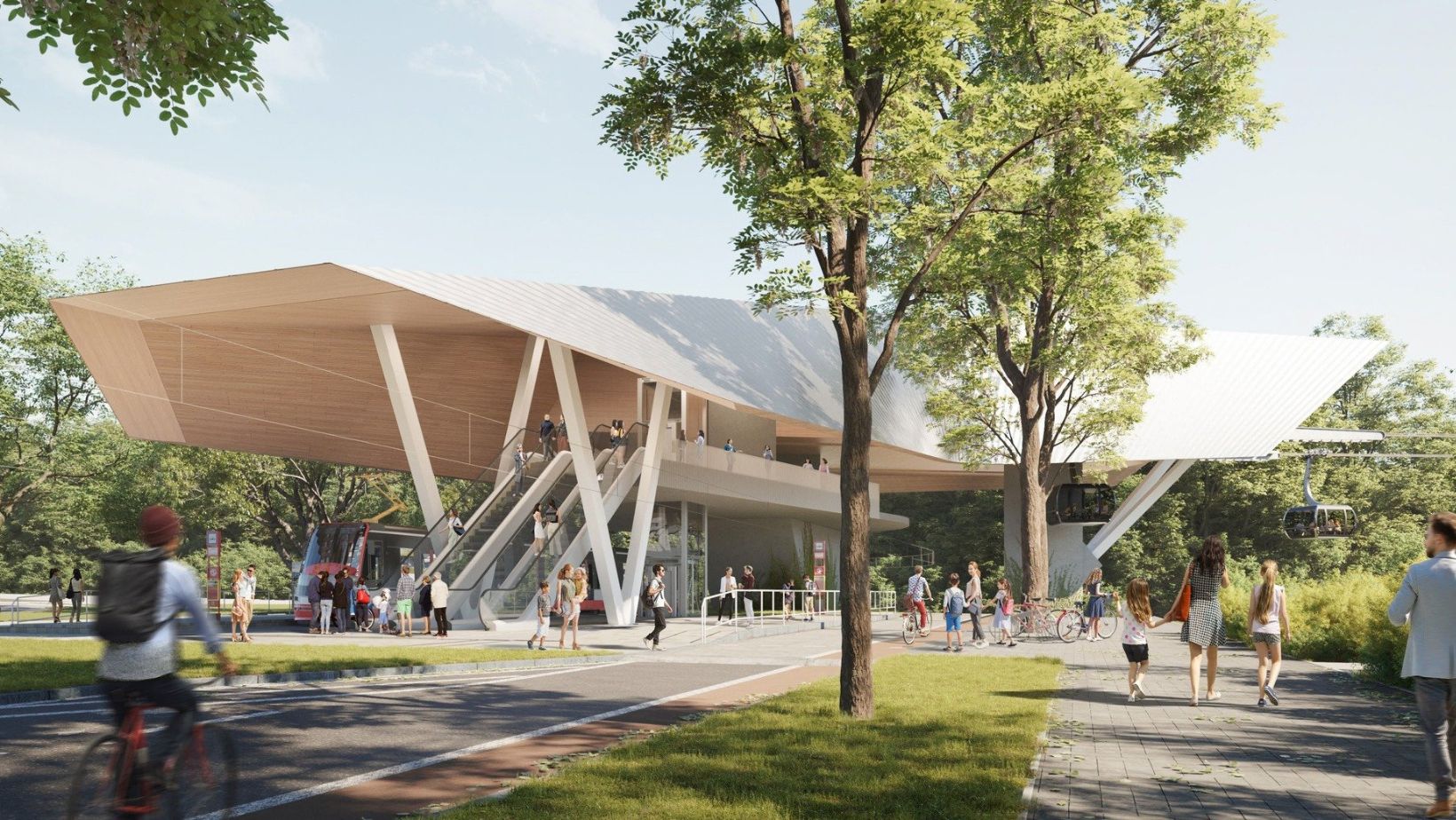
The total cost for the cable car project is expected to run just north of two billion crowns, around 500 million more than previous estimates.
The cable car is expected to be operational by 2025.
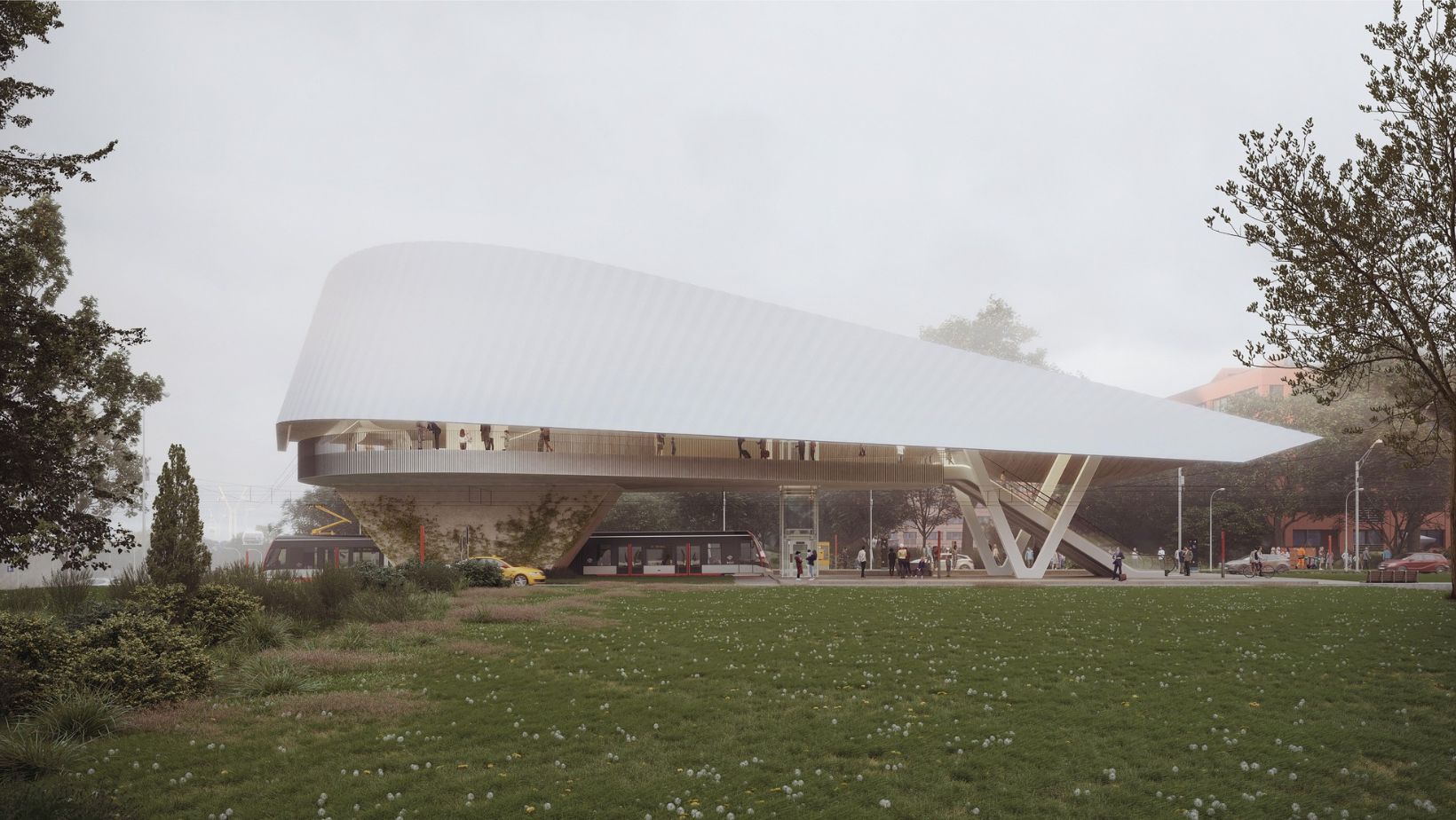
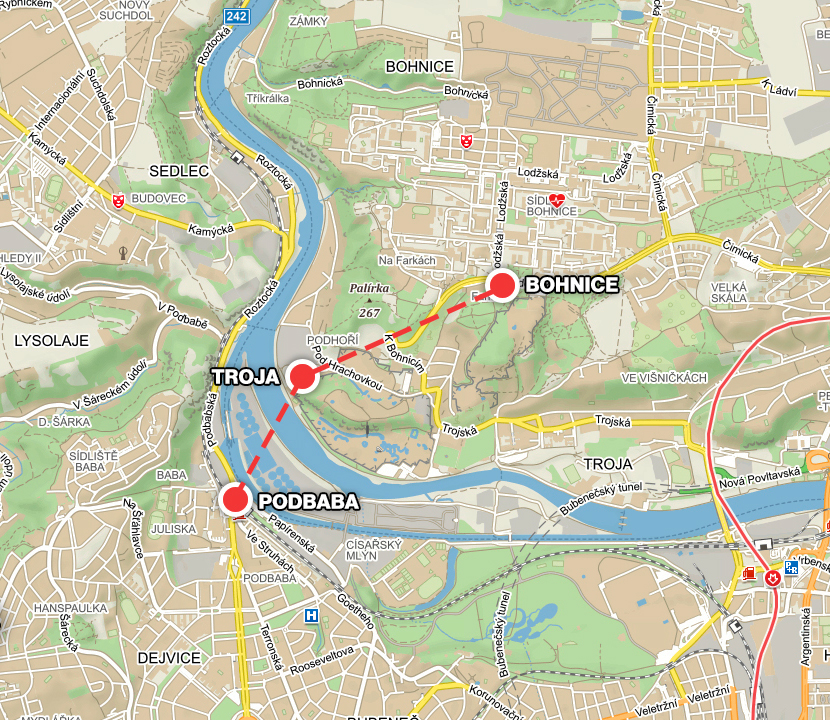
Just a few days remain until the Czech Republic’s most renowned horse race. Modeled after the Grand National in Liverpool, it’s actually the oldest and most challenging steeplechase in continental Europe.
It’s set to start on October 8, 2023, so don’t miss it!
The Velka Pardubicka Steeplechase or Grand Pardubice Steeplechase (the Czech Grand National) was first run on 4 November 1874, when 14 runners started the race.
The winner, Fantom, ridden by Englishman George Sayers received 11,700 florins for his owner Count von Cramm. The race has been held every year since on the second Sunday in October – except during the two world wars and the 1968 Russian invasion, and it has been abandoned twice due to frost and snow.
The length of the steeplechase is 6.9 km, with 31 obstacles. It usually takes 9–10 minutes to finish the course. The fastest time recorded was 8:58 minutes.
Horses starting in the race must be at least 6 years old and Czech horses must qualify by finishing at least one of four qualifying races during the season.
The most impressive obstacle is the so called Velký Taxisův příkop (Great Taxis Ditch), which has the reputation of being the toughest obstacle of the race and it is jumped only once a year and only in one race.
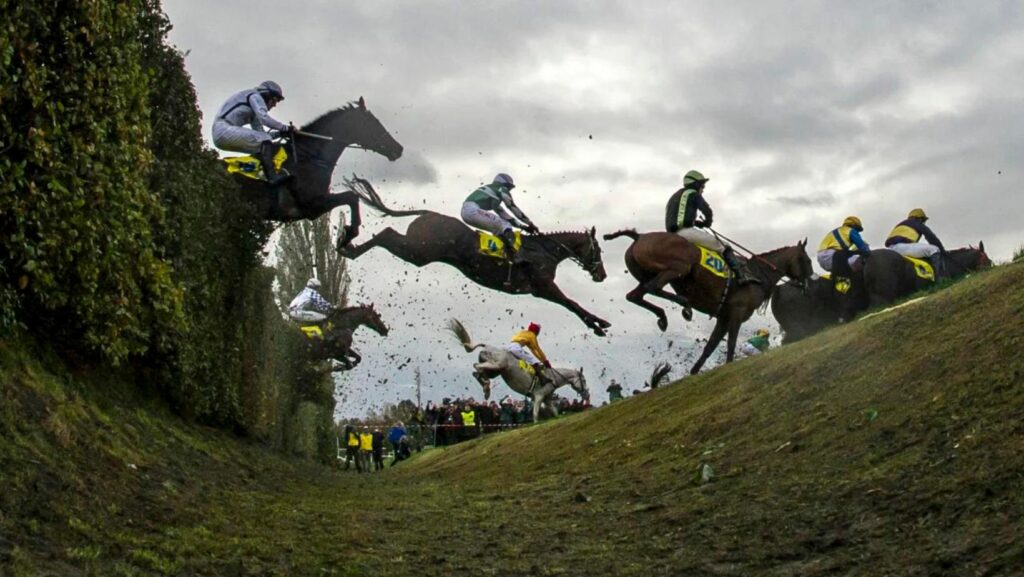
The most infamous obstacle in the race is the “Taxi Ditch” — it requires horses to jump over a 1.5 meter high hedge and a four meter long ditch which is one meter deep.
As well as the Taxi Ditch – which has become a symbol of the race – other obstacles include the Irish Bank – an obstacle where horses have to shimmer up and down a steep artificial bank, the French Jump – where a pair of hedges, spaced closely together, must be jumped as one, and a water jump which is three meters long.
The Ministry of the Interior of the Czechia Republic has announced that temporary protection for Ukrainian refugees will be extended for another year until the end of March 2025.
Through an announcement issued on September 13, the Ministry said such a decision was presented in the latest revision of the Temporary Protection Act.
“The proposal from the workshop of the Ministry of the Interior provides, among other things, that if, according to assumptions, temporary protection for refugees from the Russian war is extended at the level of the EU Council, this option will also apply in the Czech Republic,” the statement reads.
The same authority also suggests the initiation of voluntary supported repatriations to Ukraine.
As Interior Minister Vít Rakušan explains, considering the possible extension of temporary protection for those affected by Putin’s war by the European Union Council, the EU must have the legislation in order. According to him, the country intends to offer assistance to those refugees who, despite the ongoing conflict, wish to return to their country, perhaps for family reasons.
At the same time, he noted that this assistance would not include the provision of cash support but would consist of the purchase of tickets and, in exceptional circumstances, emergency accommodation costs before departure.
The Czech Republic had previously implemented a comparable approach, such as during the economic crisis in 2009 when it helped many foreign workers who had lost their jobs in the country.
Moreover, the Ministry of Interior revealed that the proposal also includes some changes in the education sector. As Ukrainian teachers have had enough time in the Czech Republic to improve their Czech language skills, there are plans to eliminate the exemption from the Czech language requirement.
In July of this year, the authorities initiated the DoToho project as a sign of solidarity with those affected by the conflict in Ukraine.
Through this project, Ukrainian managers of small and medium-sized enterprises (SMEs) will receive mentoring from leading Czech business mentors to empower and uplift those affected by the conflict.
Commenting on this decision, the European Union emphasised that the DoToho project for UA offers Ukrainian SME managers the opportunity to access mentorship from experienced professionals.
He added that these mentors will help them overcome obstacles, refine their business strategies, and improve their leadership skills.
They were placed keeping the dogs’ territorial instincts in mind.
Complaints about house facades regularly soiled with dog pee have been mounting in the city of Pilsen recently, which is why Municipal District 3 decided to do something about that problem. The solution came in the form of an unusual urban furniture item called a dog urinal (psí pisoár).
The district authorities announced at the start of this week that they’ve purchased 24 such urinals and that they’ve begun installing them on various streets around the neighbourhood.
The dog urinal appears to be a purely Czech invention integrating simple design with smart implications. They are made from concrete and feature holes that trap some of the dog pee inside the container.
The reason for this is that the urinal will be resistant to weather changes, such as rain or snow, and preserve the urine scent. That scent will keep attracting dogs to the spot where they can do their business rather than elsewhere in the city.
The latest trend in urban hygiene
What’s more, the location of the dog urinals is not random at all. You will find them in green, grassy spaces and off the sidewalks.
They are also harmonized with the dogs’ needs as territorial animals. Dogs pee on different objects not out of urgent need but as a way of marking the border of what they consider to be their domain. It is thus a way of communicating with other dogs.
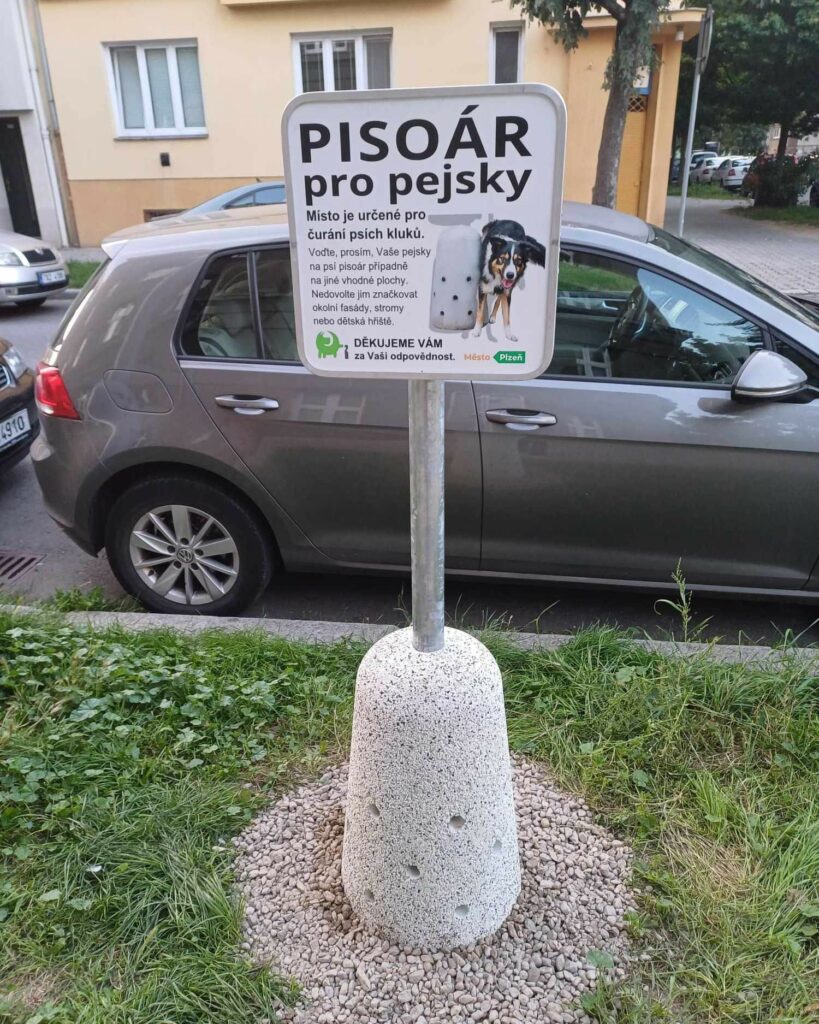
That’s why the dog urinals will be located at the beginning or end of a street or near intersections. Once a urinal has been peed on it will become known among the dog community as a marker post.
“We will be happy for residents’ feedback on whether they see that the placement of urinals fulfils its purpose -that is, whether thanks to them the number of facades of houses marked with dog signatures decreases and whether it is worth acquiring more,” explained District 3 Mayor David Procházka, as quoted by Plzen.cz.
The dog urinals will also help direct the animal owners to the right spots and not let their furry friends deface private property.
Russian President Vladimir Putin said on Tuesday that the Soviet Union’s decision to send tanks into Hungary and Czechoslovakia to crush mass protests during the Cold War was a mistake.
“It was a mistake,” Putin said when asked about perceptions of Russia as a colonial power due to Moscow’s decision to send tanks into Budapest in 1956 and into Prague in 1968.
“It is not right to do anything in foreign policy that harms the interests of other peoples,” said Putin, who in 2022 sent tens of thousands of troops into Ukraine, triggering the biggest land war in Europe since World War Two.
Putin said the United States was making the same mistakes as the Soviet Union. He said Washington had “no friends, only interests”.
The 1956 Hungarian Uprising was crushed by Soviet tanks and troops. At least 2,600 Hungarians and 600 Soviet troops were killed in the fighting.
The 1968 Prague Spring was ended when Soviet-led Warsaw Pact forces invaded the Czechoslovak Socialist Republic.
Around 137 Czechs and Slovaks died as a result of the invasion, according to Czech historians.
The Kremlin chief, whose decision to send tens of thousands of troops into Ukraine in 2022 unleashed the biggest war in Europe since WWII, also said that Russia had provided aid to other countries but had never been a coloniser.
The Czech hotel chain PYTLOUN HOTELS, which has been operating on the market since 2003 and operates fourteen design, traditional and apartment hotels in the Czech Republic, can boast another novelty.
The latest addition to its portfolio is Pytloun Sky Bar & Restaurant Prague, located on the roof terraces of Pytloun Boutique Hotel Prague on Wenceslas Square, offering guests a unique experience in the higher spheres above Prague.
With an area of up to 220 square meters, Pytloun Sky Bar & Restaurant Prague provides an exclusive setting with a magnificent 360° panoramic view of Prague Castle, Franciscan Garden, Wenceslas Square and the entire Prague skyline. With the opening of this unique space, the planned renovation and expansion of the hotel has been completed, leading to its reclassification from a 4-star to a 5-star standard.
Guests can enjoy the unique atmosphere of the lounge-style outdoor space, which is equipped with comfortable seating, planted with parasols, pots and boxes of plants and flowers.
With a seating capacity for 70 guests and an additional 70 standing places, it is the ideal place to relax, celebrate, meet friends or host private and corporate events.
Pytloun Sky Bar & Restaurant Prague is open from 8:00 am, when breakfast starts, until midnight. The architectural design and the design of the terraces are the work of Lukáš Pytloun and the renowned design studio Vrtiška & Žák.
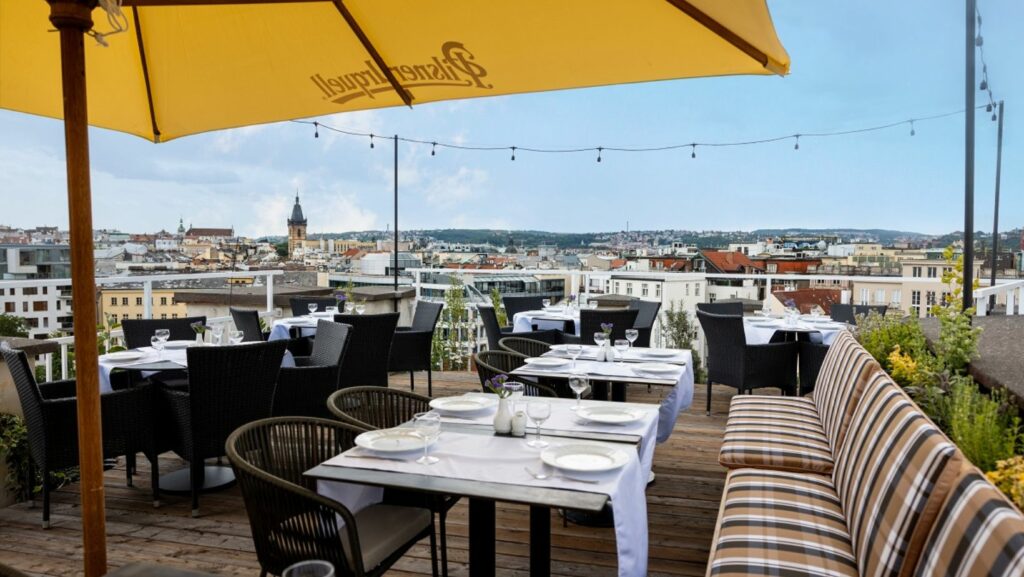
“These days we have just completed the construction of the roof terraces at our Pytloun Boutique Hotel Prague on Wenceslas Square. This successfully completes the planned renovation and extension, which resulted in the hotel’s retraining from a 4-star to a 5-star standard,” says Lukáš Pytloun, General Manager of the PYTLOUN HOTELS chain, and adds: “During the summer months, guests will not only be offered first-class gastronomy and signature drinks from experienced bartenders, but also live music performances and other interesting events in this exclusive space, which offers a breathtaking 360° panoramic view of Prague.”
High above Prague, a trained team of bartenders prepares unique signature cocktails that will amaze you with their creativity and taste experience.
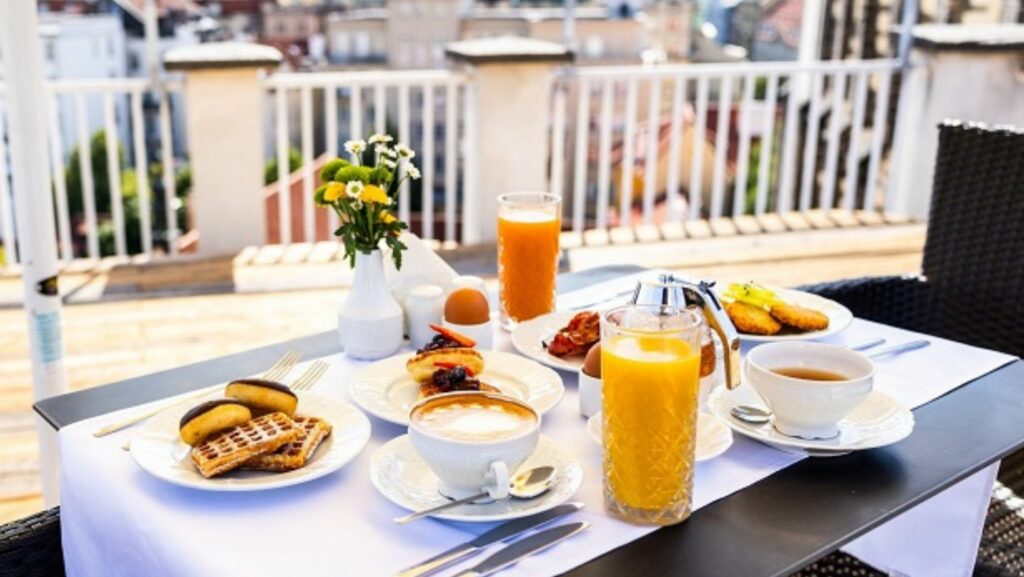
Guests can indulge in three types of rich breakfasts – English, American and fitness, which are served until 11am, and during the day enjoy modern Czech cuisine prepared by a team of chefs led by experienced chef Denis Wágner.
In the evening, guests can experience a unique view of Prague and create a unique atmosphere and energy with live music performances in the spacious rooftop area.
This exclusive space can also be rented for private or corporate events, press conferences, product launches, lectures, film screenings, weddings, engagements or romantic private evenings with live music and an unforgettable 360° view of Prague.
